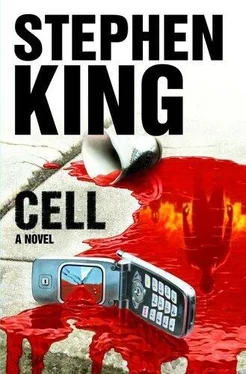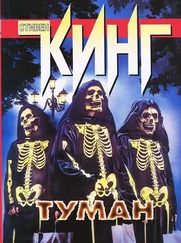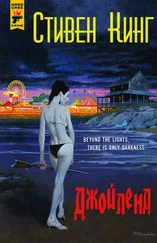"Ecce homo — insanus," he said. "Ecce femina — insana." And each time the crowd roared back "DON'T TOUCH!" in a single voice, both the phone-people and the normies. Because now there was no difference. In Clay's dream they were the same.
He awoke in the late afternoon, huddled in a ball and clutching a flat motel pillow. He went outside and saw Alice and Jordan sitting on the curb between the parking lot and the units. Alice had her arm around Jordan. His head was on her shoulder and his arm was around her waist. His hair was sticking up in back. Clay sat down with them. Beyond them, the highway leading to Route 19 and Maine was deserted except for a Federal Express truck sitting dead on the white line with its back doors standing open, and a crashed motorcycle.
Clay sat down with them. "Did you—"
"Ecce puer, insanus," Jordan said, without lifting his head from Alice's shoulder. "That's me."
"And I'm the femina," Alice said. "Clay, is there some sort of humongous football stadium in Kashwak? Because if there is, I'm not going near the place."
A door closed behind them. Footsteps approached. "Me either," Tom said, sitting down with them. "I have many issues—I'd be the first to admit it—but a death-wish has never been one of them."
"I'm not positive, but I don't think there's much more than an elementary school up there," Clay said. "The high school kids probably get bused to Tashmore."
"It's a virtual stadium," Jordan said.
"Huh?" Tom said. "You mean like in a computer game?"
"I mean like in a computer." Jordan lifted his head, still staring at the empty road leading to Sanford, the Berwicks, and Kent Pond. "Never mind that, I don't care about that. If they won't touch us—the phone-people, the normal people—who will touch us?" Clay had never seen such adult pain in a child's eyes. "Who will touch us?"
No one answered.
"Will the Raggedy Man touch us?" Jordan asked, his voice rising a little. "Will the Raggedy Man touch us? Maybe. Because he's watching, I feel him watching."
"Jordan, you're getting carried away," Clay said, but the idea had a certain weird interior logic. If they were being sent this dream—the dream of the platforms—then maybe he was watching. You didn't mail a letter if you didn't have an address.
"I don't want to go to Kashwak," Alice said. "I don't care if it's a no-phone zone or not. I'd rather go to . . . to Idaho."
"I'm going to Kent Pond before I go to Kashwak or Idaho or anywhere," Clay said. "I can be there in two nights' walk. I wish you guys would come, but if you don't want to—or can't—I'll understand."
"The man needs closure, let's get him some," Tom said. "After that, we can figure out what comes next. Unless someone's got another idea."
No one did.
10
Route 19 was totally clear on both sides for short stretches, sometimes up to a quarter of a mile, and that encouraged sprinters. This was the term Jordan coined for the semi-suicidal dragsters who would go roaring past at high speeds, usually in the middle of the road, always with their high beams glaring.
Clay and the others would see the approaching lights and get off the pavement in a hurry, right off the shoulder and into the weeds if they had spotted wrecks or stalls up ahead. Jordan took to calling these "sprinter-reefs." The sprinter would blow past, the people inside frequently whooping (and almost certainly liquored up). If there was only one stall—a small sprinter-reef—the driver would most likely elect to weave around it. If the road was completely blocked, he might still try to go around, but he and his passengers were more apt to simply abandon their vehicle and resume their eastward course on foot until they found something else that looked worth sprinting in—which was to say, something fast and temporarily amusing. Clay imagined their course as a series of jerks . . . but then, most of the sprinters were jerks, just one more pain in the ass in what had become a pain-in-the-ass world. That seemed true of Gunner, as well.
He was the fourth sprinter of their first night on Highway 19, spotting them standing at the side of the road in the flare of his headlights. Spotting Alice. He leaned out, dark hair streaming back from his face, and yelled "Suck my rod, you teenybop bitch!" as he slammed by in a black Cadillac Escalade. His passengers cheered and waved. Someone shouted "Tell huh!" To Clay it sounded like absolute ecstasy expressed in a South Boston accent.
"Charming" was Alice's only comment.
"Some people have no—" Tom began, but before he could tell them what some people didn't have, there was a scream of tires from the dark not far ahead, followed by a loud, hollow bang and the tinkle of glass.
"]esus-fuck," Clay said, and began to run. Before he had gotten twenty yards, Alice blew past him. "Slow down, they might be dangerous!" he shouted.
Alice held up one of the automatic pistols so Clay could see it and ran on, soon outdistancing him completely.
Tom caught up with Clay, already working for breath. Jordan, running beside him, could have been in a rocking chair.
"What . . . are we going . . . to do . . . if they're badly hurt?" Tom asked. "Call… an ambulance?"
"I don't know," Clay said, but he was thinking of how Alice had held up one of the automatic pistols. He knew.
11
They caught up with her around the next curve of the highway. she was standing behind the Escalade. It was lying on its side with the airbags deployed. The tale of the accident wasn't hard to read. The Escalade had come steaming around the blind curve at maybe sixty miles an hour and had encountered an abandoned milk tanker dead ahead. The driver, jerk or not, had done well to avoid being totaled. He was walking around the battered SUV in a dazed circle, pushing his hair away from his face. Blood gushed from his nose and a cut in his forehead. Clay walked to the Escalade, sneakers gritting on pebbles of Saf-T-Glas, and looked inside. It was empty. He shone his light around and saw blood on the steering wheel, nowhere else. The passengers had been lively enough to exit the wreck, and all but one had fled the scene, probably out of simple reflex. The one who had stuck with the driver was a shrimpy little postadolescent with bad acne scars, buck teeth, and long, dirty red hair. His steady line of jabber reminded Clay of the little dog who idolized Spike in the Warner Bros, cartoons.
"Ah you all right, Gunnah?" he asked. Clay presumed this was how you pronounced Gunner in Southie. "Holy shit, you're bleedin like a mutha. Fuckin-A, I thought we was dead." Then, to Clay: "Whuttajw lookin at?"
"Shut up," Clay said—and, under the circumstances, not unkindly. The redhead pointed at Clay, then turned to his bleeding friend. "This is one of em, Gunnah! This is a bunch of em!"
"Shut up, Harold," Gunner said. Not kindly at all. Then he looked at Clay, Tom, Alice, and Jordan.
"Let me do something about your forehead," Alice said. She had reholstered her gun and taken off her pack. Now she was rummaging through it. "I've got Band-Aids and gauze pads. Also hydrogen peroxide, which will sting, but better a little sting than an infection, am I right?"
"Considering what this young man called you on his way by, you're a better Christian than I was in my prime," Tom said. He had unslung Sir Speedy and was holding it by the strap as he looked at Gunner and Harold.
Gunner might have been twenty-five. His long black rock-vocalist hair was now matted with blood. He looked at the milk tanker, then at the Escalade, then at Alice, who had a gauze pad in one hand and the bottle of hydrogen peroxide in the other.
Читать дальше








